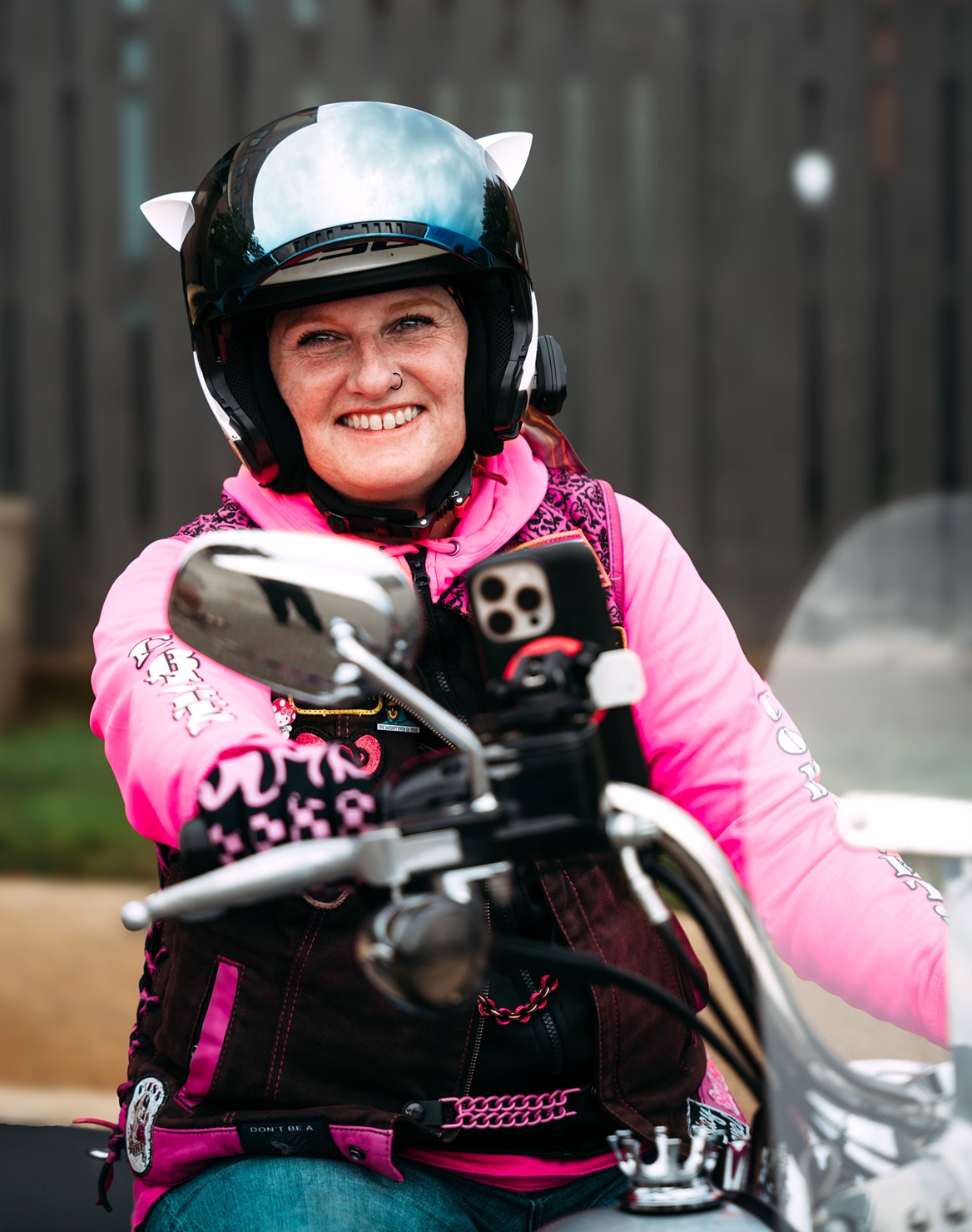
Published on October 8, 2025
Read Time: 4 Minutes
Three Things to Know
- Maggie Espinoza battled thyroid cancer in 2017 and metastatic breast cancer just 2 years later.
- Now in remission, she finds peace riding her motorcycle and has embraced a mission of advocacy.
- Maggie urges women, especially those in the military, to take their health seriously and never ignore symptoms.
In 2019, Waynesville resident and Army combat veteran Maggie Espinoza, now 45, noticed dimpling on her breast as she stepped out of the shower. She had been experiencing pain in the area, but dismissed it as a pulled muscle. The change in her skin was new, however, and had appeared overnight. Her husband urged her to see a doctor. A mammogram and biopsy revealed invasive ductal carcinoma, a form of breast cancer.
Maggie was shaken by the list of additional tests and treatments recommended.
“I’m thankful that my mother-in-law and husband were both with me, because I was a nervous wreck,” Maggie said of the day she received her diagnosis. “They were able to listen to what the doctor was saying—but to me, everything was a blur.”
This wasn’t Maggie’s first battle with cancer. Two years earlier, in 2017, a fertility exam had uncovered a suspicious nodule in her thyroid, which turned out to be thyroid cancer. After surgery to remove her thyroid, Maggie underwent treatment at the Phelps Health Delbert Day Cancer Institute (DDCI) under the care of Radiation Oncologist Christopher Spencer, MD, MS, DABR.
“The doctor, nurses and staff were wonderful and always positive,” she said. “Everyone was extremely friendly.”

After the breast cancer diagnosis, Maggie returned to the DDCI, where a PET scan revealed something even more devastating—the cancer had spread to her liver. Maggie was now facing a diagnosis of metastatic breast cancer (breast cancer that has spread to other parts of the body).
Through chemotherapy, radiation and a bilateral mastectomy, Maggie continued working and did her best to keep her life on track. Nurses monitored her closely during infusion sessions, managing reactions to treatment with skill and efficiency. Small but important gestures—lap blankets provided by Phelps Health Auxiliary and Volunteer Services, and gas cards, wigs and complimentary meals provided by the Phelps Health Foundation—made long infusion sessions more comfortable, and helped her feel seen and cared for.
“Everyone on the team genuinely cared about me,” Maggie said. “Even the receptionists knew me and greeted me by name. It made a world of difference.”
Eventually, Maggie rang the bell to signal the end of her chemotherapy, while her medical oncologist, Kan Huang, MD, PhD, MS, looked on.
“In the face of a tough cancer diagnosis at a young age, Maggie endured with strength,” Dr. Huang recalled. “She turned every challenging step into a story of hope.”
Today, she remains in remission with no recurrences, although she continues with regular scans, follow-ups and oral medication. As she approaches the end of a 5-year treatment cycle, she admits to some anxiety about what lies ahead, but she feels prepared.
“I'm in good hands,” Maggie said, “If something reoccurs, I'll make it through. It helps having a team like I had.”
Throughout her cancer journey, Maggie has turned to her motorcycle for release. Riding gives her a sense of freedom and clarity when everything feels overwhelming. It’s her way to shut out fear and stress while focusing only on the road ahead.
“When I ride, I’m in my nothing box,” she said. “Nothing exists except me and my bike. It’s incredibly freeing and healing.”
She is also an active member of the Combat Veterans Motorcycle Association, Chapter 411, where she is known as “Glowstick.” Among her fellow riders, she’s found camaraderie and purpose. The nonprofit motorcycle club focuses on veterans helping veterans, and Maggie participates in community events, visits to senior centers and outreach for fellow female veterans navigating cancer.
“I am here,” Maggie said, “living my life, riding my motorcycle and doing all the things.”

Maggie is passionate about raising awareness and supporting others facing breast cancer. She is a member of Pink Veterans, a group aligned with the Susan G. Komen Foundation, and recently participated in the More Than Pink Walk.
“Seeing that sea of women in pink supporting one another was incredible,” Maggie said. “It feels great being part of something bigger than yourself.”
Maggie knows how easy it is for women to downplay their health concerns but stresses that delaying care can have serious consequences, especially when military women face a heightened risk of developing breast cancer.
“When you’re active duty, you push aches and pains aside and focus on the mission,” she explained. “But we’re killing ourselves by not talking about this. As a female veteran, I feel like I have to look out for the younger women coming up behind me.”
She encourages women—especially those on active duty—to take their health seriously, to prioritize early detection and to have open conversations with their healthcare providers.
“My message is simple: look after yourself, speak up if something seems off and don’t ignore symptoms,” she said. “I want other women to know they are not alone, and there is care, support and hope available.”
Early Detection Saves Lives
Schedule your mammogram today at the Phelps Health Comprehensive Breast Center or call (573) 458-7737.